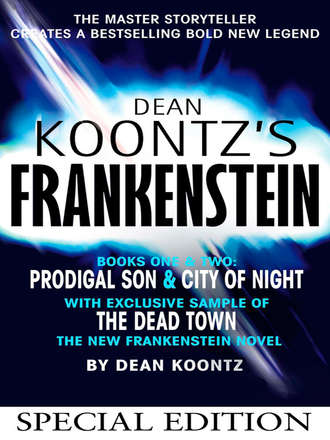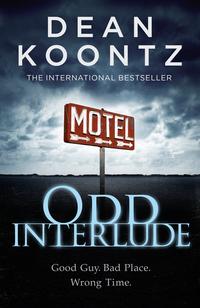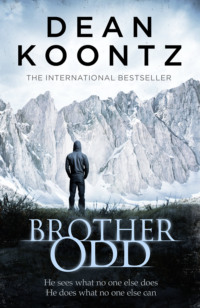
Полная версия
Frankenstein Special Edition: Prodigal Son and City of Night
He cannot stop working the crossword, for he desperately needs the temporary peace that its completion will bring him. Nevertheless, as he reads the clues and inks the letters in the empty squares, he considers the possibility that finding happiness by relieving Arnie O’Connor of it might prove to be not a dream but a destiny.
CHAPTER 27
DRIVING AWAY FROM the medical examiner’s office, into a world transformed by what they had just learned, Carson said, “Two hearts? Strange new organs? Designer freaks?”
“I’m wondering,” Michael said, “if I missed a class at the police academy.”
“Did Jack smell sober to you?”
“Unfortunately, yeah. Maybe he’s nuts.”
“He’s not nuts.”
“People who were perfectly sane on Tuesday sometimes go nuts on Wednesday.”
“What people?” she asked.
“I don’t know. Stalin.”
“Stalin was not perfectly sane on Tuesday. Besides, he wasn’t insane, he was evil.”
“Jack Rogers isn’t evil,” Michael said. “If he’s not drunk, insane, or evil, I guess we’re going to have to believe him.”
“You think somehow Luke might be hoaxing old Jack?”
“Luke ‘been-interested-in-viscera-since-I-was-a-kid’? First of all, it would be a way elaborate hoax. Second, Jack is smarter than Luke. Third, Luke—he’s got about as much sense of humor as a graveyard rat.”
A disguise of clouds transformed the full moon into a crescent. The pale flush of streetlamps on glossy magnolia leaves produced an illusion of ice, of a northern climate in balmy New Orleans.
“Nothing is what it seems,” Carson said.
“Is that just an observation,” Michael asked, “or should I worry about being washed away by a flood of philosophy?”
“My father wasn’t a corrupt cop.”
“Whatever you say You knew him best.”
“He never stole confiscated drugs out of the evidence lockup.”
“The past is past,” Michael advised.
Braking to a stop at a red traffic light, she said, “A man’s reputation shouldn’t have to be destroyed forever by lies. There ought to be a hope of justice, redemption.”
Michael chose respectful silence.
“Dad and Mom weren’t shot to death by some drug dealer who felt Dad was poaching on his territory. That’s all bullshit.”
She hadn’t spoken aloud of these things in a long time. To do so was painful.
“Dad had discovered something that powerful people preferred to keep secret. He shared it with Mom, which is why she was shot, too. I know he was troubled about something he had seen. I just don’t know what it was.”
“Carson, we looked at the evidence in his case a hundred times,” Michael reminded her, “and we agreed it’s too airtight to be real. No file of evidence is ever braided that tight unless it’s concocted. In my book, it’s proof of a frame. But that’s the problem, too.”
He was right. The evidence had been crafted not only with the intent of convicting her father postmortem, but to leave no clue as to the identity of those who had crafted it. She had long sought the one loose thread that would unravel it, but no such thread could be found.
As the traffic light turned green, Carson said, “We’re not far from my place. I’m sure Vicky’s got everything under control, but I feel like I ought to check on Arnie, if that’s okay.”
“Sure. I could use some of Vicky’s bad coffee.”
CHAPTER 28
IN THE MASTER BEDROOM of the Helios estate, all was not well.
What Victor wanted from sex exceeded mere pleasure. Furthermore, he did not merely want to be satisfied but fully expected to be. His expectation was in fact a demand.
According to Victor’s philosophy, the world had no dimension but the material. The only rational response to the forces of nature and of human civilization was to attempt to dominate them rather than be humbled by them.
There were serfs and there were masters. He himself would never wear a slave’s collar.
If there was no spiritual side to life, then there could be no such thing as love except in the minds of fools; for love is a state of spirit, not of flesh. In his view, tenderness had no place in a sexual relationship.
At its best, sex was a chance for the dominant person to express control of the submissive partner. The fierceness of the dominance and the completeness of the submission led to satisfaction of greater intensity than love could have provided even if love had existed.
Erika Four, like the three before her and like the other brides that he had made for himself, was not a partner in the traditional sense of marriage. To Victor, she was an accoutrement that allowed him to function more effectively in social situations, a defense against the annoyance of women who saw in him the prospect of wealth by marriage, and an instrument of pleasure.
Because pleasure and power were synonymous to him, the intensity of his satisfaction was directly proportional to the cruelty with which he used her. He was often very satisfied.
Like all of his modern creations, in a crisis she could block the perception of pain at will. During sex, he did not permit her to do so. Her submission would be more satisfyingly complete and genuine if she were made to suffer.
If he struck her particularly hard, the evidence would be gone in hours, for like all his people, she healed rapidly. Bleeding lasted less than a minute. Cuts healed without scars in a few hours. Bruises sustained in the night would have faded by dawn.
Most of his people were psychologically engineered to be utterly incapable of humiliation, for shame in all its shades grew from an acceptance of the belief that Moral Law lay at the heart of creation. In the war against ordinary humanity, which he would one day launch, he required soldiers without moral compunctions, so certain of their superiority that no ruthlessness would be beyond them.
He allowed Erika humility, however, because from humility arose a quality of innocence. Although he was not entirely sure why this should be the case, the mildest abuse of a delicate sensibility was more thrilling than committing savageries against a woman who lacked all innocence.
He forced her to endure the things that most shamed her because, ironically, the greater her shame and self-disgust, the further she would lower herself and the more obedient she would become. He had made her strong in many ways, but not so strong that he could not break her will and mold her as he wished.
He valued subservience in a wife more if it had been beaten into her than if it had been engineered in the tank, for in the latter case, her slavish obedience felt mechanical and dull.
Although he could remember a time, centuries ago in his youth, when he had felt differently about women and marriage, he could not recall or understand why that young Victor had felt the way he did, what belief had motivated him. He didn’t actually try to understand, however, because he had for a long time taken this different road, and there was no going back.
Young Victor had also believed in the power of the human will to bend nature to its desires; and it was that aspect of his early self with which Victor could still identify. All that mattered was the triumph of the will.
What was wrong here in the bedroom was that for once his will failed to bend reality to its desire. He wanted sexual satisfaction, but it eluded him.
His mind kept straying back to the dinner party, to the sight and sound of Erika noisily sucking soup from spoon.
At last he rolled off her, onto his back, defeated.
They stared at the ceiling in silence until she whispered, “I’m sorry.”
“Maybe the fault is mine,” he said, meaning that perhaps he had made some mistake in the creation of her.
“I don’t excite you.”
“Usually, yes. Not tonight.”
“I’ll learn,” she promised. “I’ll improve.”
“Yes,” he said, for that was what she must do if she hoped to keep her role, but he had begun to doubt that Erika Four would be the final Erika.
“I’m going to the hospital,” he said. “I’m in a creative mood.”
“The Hands of Mercy” She shuddered. “I think I dream of it.”
“You don’t. I spare all of you from dreams of your origins.”
“I dream of someplace,” she persisted. “Dark and strange and full of death.”
“There’s your proof that it’s not the Hands of Mercy. My labs are full of life.”
Both bored with Erika and troubled by the direction of her musings, Victor rose from the bed and went naked into the bathroom.
A jewel in this mounting of gold-plated fixtures and marble-clad walls, he looked at himself in the beveled mirrors and saw something much more than human.
“Perfection,” he said, though he knew that he was just shy of that ideal.
Looping through his torso, embedded in his flesh, entwining his ribs, spiraling around his spine, a flexible metallic cord and its associated implants converted simple electrical current—to which he submitted himself twice a day—into a different energy, a stimulating charge that sustained a youthful rate of cellular division and held biological time at bay.
His body was a mass of scars and strange excrescences, but he found them beautiful. They were the consequences of the procedures by which he’d gained immortality; they were the badges of his divinity.
One day he would clone a body from his DNA, enhance it with the many improvements he had developed, expedite its growth, and with the assistance of surgeons of his making, he’d have his brain transferred to that new home.
When that work was finished, he would be the model of physical perfection, but he would miss his scars. They were proof of his persistence, his genius, and the triumph of his will.
Now he got dressed, looking forward to a long night in his main laboratory at the Hands of Mercy.
CHAPTER 29
WHILE CARSON CHECKED on her castle-building brother, Michael stood at a kitchen counter with a mug of Vicky’s coffee.
Having just finished cleaning the oven, Vicky Chou said, “How’s the java?”
“As bitter as bile,” he said.
“But not acidic.”
“No,” he admitted. “I don’t know how you manage to make it bitter without it being acidic, but you do.”
She winked. “My secret.”
“Stuff’s as black as tar. This isn’t a mistake. You actually try to get it like this, don’t you?”
“If it’s so terrible,” she said, “why do you always drink it?”
“It’s a test of my manhood.” He took a long swallow that made his face pucker. “I’ve been doing a lot of thinking lately, but you’ll tell me to shut up, you don’t want to know.”
Washing her hands at the sink, she said, “I have to listen to you, Michael. It’s part of my job description.”
He hesitated but then said, “I’ve been thinking how things might be if Carson and I weren’t partners.”
“What things?”
“Between her and me.”
“Is there something between you and her?”
“The badge,” he said mournfully. “She’s too solid a cop, too professional to date a partner.”
“The bitch,” Vicky said drily.
Michael smiled, sampled the coffee, grimaced. “Problem is, if I changed partners so we could date, I’d miss kicking ass and busting heads together.”
“Maybe that’s how the two of you relate best.”
“There’s a depressing thought.”
Vicky clearly had more to say, but she clammed up when Carson entered the kitchen.
“Vicky,” Carson said, “I know you’re good about keeping doors locked. But for a while, let’s be even more security conscious.”
Frowning, Vicky asked, “What’s wrong?”
“This weird case we’re on…it feels like…if we’re not careful, it could come home to us, right here.” She glanced at Michael. “Does that sound paranoid?”
“No,” he said, and finished the rest of the bitter coffee as though the taste of it would make their unsatisfying relationship seem sweeter by comparison.
IN THE CAR AGAIN, as Carson swung away from the curb, Michael popped a breath mint in his mouth to kill the sour stench of Vicky’s death brew. “Two hearts…organs of unknown purpose…I can’t get Invasion of the Body Snatchers out of my head, pod people growing in the basement.”
“It’s not aliens.”
“Maybe not. Then I think…weird cosmic radiation, pollution, genetic engineering, too much mustard in the American diet.”
“Psychological profiles and CSI techs won’t be worth a damn on this one,” Carson said. She yawned. “Long day. Can’t think straight anymore. What if I just drive you home and we call it a wrap?”
“Sounds swell. I’ve got a new pair of monkey-pattern jammies I’m eager to try on.”
She took a ramp to the expressway, headed west toward Metairie. The traffic was mercifully light.
They rode in silence for a while, but then he said, “You know, if you ever want to petition the chief of detectives to reopen your dad’s case and let us take a whack at it, I’m game.”
She shook her head. “Wouldn’t do it unless I had something new—a fresh bit of evidence, a different slant on the investigation, something. Otherwise, we’d just be turned down.”
“We sneak a copy of the file, review the evidence on our own time, look into it until we turn up the scrap we need.”
“Right now,” she said wearily, “we don’t really have any time of our own.”
As they exited the expressway, he said, “The Surgeon case will break. Things will ease up. Just remember, I’m ready when you are.”
She smiled. He loved her smile. He didn’t see enough of it.
“Thanks, Michael. You’re a good guy.”
He would have preferred to hear her say that he was the love of her life, but “good guy” was at least a starting point.
When she pulled to the curb in front of his apartment house, she yawned again and said, “I’m beat. Exhausted.”
“So exhausted, you can’t wait to go straight back to Allwine’s apartment.”
Her smile was smaller this time. “You read me too well.”
“You wouldn’t have stopped to check on Arnie if you intended to go home after dropping me off.”
“I should know better than to bullshit a homicide dick. It’s those black rooms, Michael. I need…to work them alone.”
“Get in touch with your inner psychic.”
“Something like that.”
He got out of the car, then leaned in through the open door. “Ditch the twelve-hour days, Carson. There’s no one you’ve got to prove anything to. Not anyone on the force. Not your dad.”
“There’s me.”
He closed the door and watched her drive away. He knew that she was tough enough to take care of herself, but he worried about her.
He almost wished that she were more vulnerable. It half broke his heart that she didn’t need him desperately.
CHAPTER 30
ROY PRIBEAUX ENJOYED the date more than he expected. Usually it was an annoying interlude between the planning of the murder and the commission of it.
Candace proved to be shy but charming, genuinely sweet with a dry, self-deprecating sense of humor.
They had coffee in a riverfront café. When they fell at once into easy conversation about a host of subjects, Roy was surprised but also pleased. The lack of any initial awkwardness would more quickly disarm the poor thing.
After a while she asked him exactly what he’d meant the previous night when he’d called himself a Christian man. Of what denomination, what commitment?
He knew at once that this was the key with which to unlock her trust and win her heart. He had used the Christian gambit in a couple of other instances, and with the right woman, it had worked as well as the expectation of great sex or even of love.
Why he, an Adonis, should be interested in a schlump like her—that mystery fed her suspicion. It made her wary.
If she believed, however, that he was a man of genuine moral principle who sought a virtuous companion and not just a good hump, she would see him as one with higher standards than physical beauty. She would convince herself that her lovely eyes were enough physical beauty for him and that what he really prized was her innocence, her chastity, her personality, and her piety.
The trick was to divine the brand of Christianity that she had embraced, then convince her that they shared that particular flavor of the faith. If she was a Pentecostal, his approach would have to be far different from that required if she was a Catholic, and much different from the worldly and ironic style that he must assume if she was Unitarian.
Fortunately, she proved to be an Episcopalian, which Roy found markedly easier to fake than one of the more passionate sects. He might have been lost if she’d been a Seventh Day Adventist.
She proved to be a reader, too, and especially a fan of C. S. Lewis, one of the finest Christian writers of the century just past.
In his quest to be a Renaissance man, Roy had read Lewis: not all of his many books, but enough. The Screwtape Letters. The Problem of Pain. A Grief Observed. Thankfully they had been short volumes.
Dear Candace was so enchanted to have a handsome and interested man as a conversationalist that she overcame her shyness when the subject turned to Lewis. She did most of the talking, and Roy needed only to insert a quote here and a reference there to convince her that his knowledge of the great man’s work was encyclopedic.
Another fortunate thing about her being an Episcopalian was that her denomination did not forbid drink or the joy of sensuous music. From the café, he talked her into a jazz club on Jackson Square.
Roy had a capacity for alcohol, but one potent hurricane erased whatever lingering caution Candace might otherwise have harbored.
After the jazz club, when he suggested they take a walk on the levee, her only concern was that it might be closed at this hour.
“It’s still open to pedestrians,” he assured her. “They just don’t keep it lit for the roller skaters and fishermen.”
Perhaps she would have hesitated to stroll the unlighted levee if he hadn’t been such a strong man, and so good, and capable of protecting her.
They walked toward the river, away from the shopping district and the crowds. The full moon provided more light than he would have liked but also enough to allay any of Candace’s lingering concern about their safety
A brightly decorated riverboat chattered by, its great paddle wheel splashing through warm water. Passengers stood on the decks, sat at tables. This late-night river cruise wouldn’t stop at any nearby docks. Roy had checked the schedules, always planning ahead.
They ambled to the end of the pavement atop the breakwater of boulders. Fishermen were more likely to come this far in daylight. As he expected, here in the night, he and Candace were alone.
The lights of the receding riverboat painted serpentine ribbons of oily color on the dark water, and Candace thought this was pretty, and in fact so did Roy, and they watched it for a moment before she turned to him, expecting a chaste kiss, or even one not so chaste.
Instead, he squirted her in the face with the squeeze bottle of chloroform that he had withdrawn from a jacket pocket.
He had found this saturation technique to be far quicker, more effective, and less of a struggle than a soaked cloth. The fluid penetrated her nostrils, splashed her tongue.
Choking, gasping for breath and thereby inhaling the anesthetic, Candace dropped as suddenly and as hard as if she had been shot.
She fell on her side. Roy rolled her onto her back and knelt next to her.
Even in the insistent silvery moonlight, they presented a low profile to anyone who might look this way from a craft on the river. Glancing back the way they had come, Roy saw no other late strollers.
From an inside jacket pocket, he produced a stiletto and a compact kit of scalpels and other instruments.
He didn’t need larger tools for this one. The eyes would be simple to extract, though he must be careful not to damage the part of them that he considered to be perfectly beautiful.
With the stiletto, he found her heart and conveyed her from sleep to death with only the faintest liquid sound.
Soon the eyes were his, safely in a small plastic bottle full of saline solution.
On his way back to the lights and the jazz, he was surprised when he suddenly had a taste for cotton candy, not a treat that he had ever before craved. But of course the red wagon was closed and might not open for days.
CHAPTER 31
A NINETEENTH-CENTURY stonemason had chiseled HANDS OF MERCY into a limestone block above the hospital entrance. A weathered image of the Virgin Mary overlooked the front steps.
The hospital had closed long ago, and after the building had been sold to a shell corporation controlled by Victor Helios, the windows had been bricked shut. Steel doors had been installed at every entrance, equipped with both mechanical and electronic locks.
A tall wrought-iron fence surrounded the oak-shaded property, like a stockpile of spears from a full Roman legion. To the rolling electric gate was affixed a sign: PRIVATE WAREHOUSE / NO ADMITTANCE.
Hidden cameras surveyed the grounds, the perimeter. No nuclear weapons storage depot had a larger or more dedicated security force, or one more discreet.
The forbidding structure stood silent. No beam of light escaped it, though here the new rulers of the Earth were designed and made.
A staff of eighty lived and worked within these walls, assisting in experiments in a maze of laboratories. In rooms that had once held hospital patients, newly minted men and women were housed and rapidly educated until they could be infiltrated into the population of the city.
The armored doors of certain other rooms were locked. The creations within them needed to be restrained while being studied.
Victor conducted his most important work in the main laboratory. This vast space had a techno sensibility with some Art Deco style and a dash of Wagnerian grandeur. Glass, stainless steel, white ceramic: All were easy to sterilize if things got…messy.
Sleek and arcane equipment, much of which he himself designed and built, lined the chamber, rose out of the floor, depended from the ceiling. Some of the machines hummed, some bubbled, some stood silent and menacing.
In this windowless lab, if he put his wristwatch in a drawer, he could labor long hours, days, without a break. Having improved his physiology and metabolism to the point that he needed little or no sleep, he was able to give himself passionately to his work.
Tonight, as he arrived at his desk, his phone rang. The call came on line five. Of eight lines, the last four—rollovers that served a single number—were reserved for messages and inquiries from those creations with which he had been gradually populating the city.
He picked up the handset. “Yes?”
The caller, a man, was struggling to repress the emotion in his voice, more emotion than Victor ever expected to hear from one of the New Race: “Something is happening to me, Father. Something strange. Maybe something wonderful.”
Victor’s creations understood that they must contact him only in a crisis. “Which one are you?”
“Help me, Father.”
Victor felt diminished by the word father. “I’m not your father. Tell me your name.”
“I’m confused…and sometimes scared.”
“I asked for your name.”
His creations had not been designed to have the capability to deny him, but this one refused to identify himself: “I’ve begun to change.”
“You must tell me your name.”
“Murder,” said the caller. “Murder…excites me.”
Victor kept the growing concern out of his voice. “No, your mind is fine. I don’t make mistakes.”










